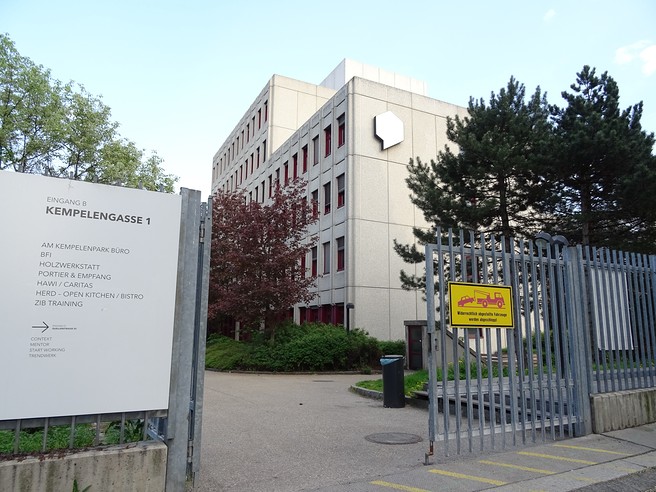Photo: Former Siemens headquarters, HAWI on floor 4 & 5, Vienna
Connecting students with and without a refugee background: the integrative housing project HAWI. After approaching the Veldacademie for a possible research internship as part of my Master’s Thesis in Sociology at Erasmus University (Governance of Migration and Diversity), I was suggested to conduct research on the HAWI project which is located in Vienna. Not only because it is the first pilot project of the Home not Shelter! initiative of which the Veldacademie is part of, but because I am a native German speaker (from Switzerland) and have been personally and professionally interested in the issues of migration and integration. Regarding my personal background and interests, I was very enthusiastic to start my research internship at the Veldacademie with the possibility of conduct field work in Vienna. To get an impression of the research process, I will elaborate on my research and field work below.
To get to know more about HAWI, I started to read online newspaper articles about the project and talked to people of the Home not Shelter! initiative. In this manner, I learned that HAWI was initiated in 2016 by the aid organisation Caritas and the next ENTERprise Architects in Vienna. In collaboration with the Home not Shelter! initiative, the idea was to create new social forms of living together by transforming office spaces in an old Siemens headquarters to multiple living spaces. Architecture students from several universities and future HAWI residents created 140 living spaces to provide housing for a mixed group of residents consisting of students with and without a refugee background. With shared bedrooms and common rooms, the aim of HAWI was to enhance the interaction between different social groups. And indeed, throughout living in HAWI, residents not only shared their living space but also their spare time, built friendships and developed a strong sense of community.
After I got a clearer idea about HAWI, I decided to research how HAWI contributed to this developed sense of community and how the project influenced the integration process of students with a refugee background. However, an unexpected announcement changed my initial research topic. The pilot project HAWI was planned for three years, but in the end of January 2018, I read in several media articles that the project will close by June 2018 and that half of the residents already move out by February 2018. According to the articles, the decision made by Caritas was very unexpected and generated a lot of resistance among the HAWI residents who eventually decided to continue the project on their own. This sudden change and development of HAWI caught my attention. As unfortunate the announcement of project closure was, it provided me with a new research topic which seemed more substantial, namely how HAWI residents reacted to the project closure and how they continued the project on their own. Moreover, I recognised the opportunity to connect my new research topic to the emerging but empirically poorly studied theory of community resilience, which led to the following research question for my thesis: How can the reaction of HAWI residents to the project closure be explained by mechanisms of community resilience?
Once my aim of research was defined, I decided to apply a qualitative research method to present the personal experiences and motivations of HAWI residents regarding the continuation of the project. Therefore, I contacted Caritas Vienna to explain my research topic and obtain contact details of HAWI residents to find possible respondents. Unfortunately, Caritas was not willing to collaborate and I was requested not to conduct any interviews with current HAWI residents. The explicit reasons for this request remained unclear. After a first moment of disbelief and disappointment, I decided to directly contact HAWI residents via their official Facebook page. Luckily, I received many positive reactions and could get in contact with possible interview respondents. Knowing that there are enough residents who are pleased to talk to me, I travelled to Vienna to conduct fieldwork for ten days in April 2018. During the time in Vienna, I visited the HAWI building several times and interviewed many former and current HAWI residents who openly shared their opinions, experiences and motivations with me. Through the social network of respondents, I could get in contact with further respondents and eventually managed to conduct 22 interviews. Throughout my whole thesis trajectory, the fieldwork in Vienna was the most enriching one as I met many young and inspiring people who developed a strong attachment to the HAWI project and, until today, demonstrate motivation and hope to continue the project in a certain form in the future.
If you like to get an impression of HAWI and the active engagement of its residents, please visit https://www.facebook.com/savehawi/. Unfortunately, despite all the efforts made, HAWI is closed by now but a few residents still aim to initiate a HAWI 2.0 in the future.
Interested in the results of Lhamo's research? Read her master thesis here
